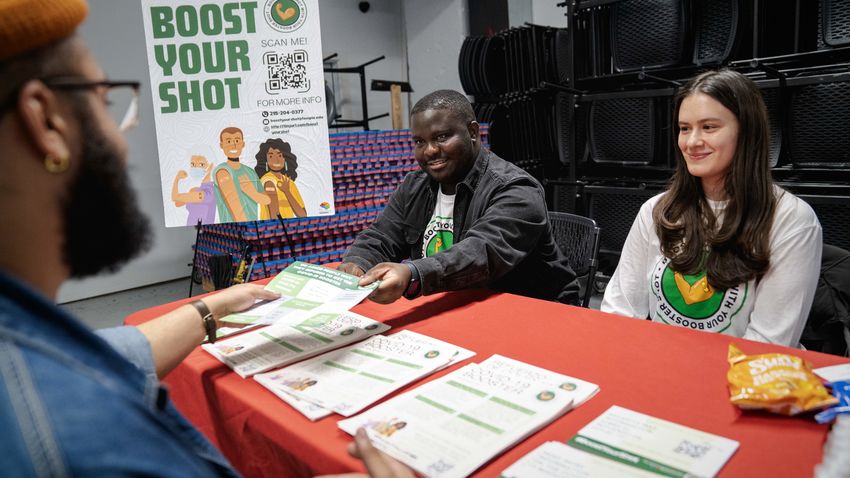
Since the COVID-19 outbreak four years ago, the College of Public Health’s Risk Communication Lab has been working with community groups to develop effective messaging that can combat misinformation and encourage people to protect themselves and others. The lab’s work on COVID safety began with social distancing and masking, moved to the importance of vaccination as part of the college's RapidVax project, and now has evolved into a neighborhood-based campaign promoting COVID booster shots.
Funded by a research grant from the Catalytic Collaborative Funding Initiative, administered by Temple’s Office of the Vice President for Research, lab director Sarah Bass and her research team conducted extensive interviews and public surveys with people who had gotten the first COVID-19 vaccination series, but not a booster, in order to better understand “booster hesitancy.” They developed materials based on that information and have been taking fact sheets and expertise to community events in areas of the city with low booster rates. Last month, Bass and some of her undergraduate students and staff set up an information table at a health fair at Rock Ministries, a church and community center in the heart of Philadelphia’s Kensington neighborhood.
“We’re going out somewhere just about every week. Food distribution events, church events,” says Bass, professor of social and behavioral sciences. “The focus has been on understanding hesitancy about getting a booster in those who got the original vaccination. We did a year or so of formative work, qualitative interviews with people who had been boosted—and people who had not been boosted. Then we did a citywide survey with people who had not been boosted to try and understand what was driving that. Based on those results, we developed this community-based communications campaign.”
The COVID-19 booster campaign is called Boost your Shot. Temple is partnering with community organizations such as New Kensington Community Development Corp., HACE CDC, Esperanza, and Impact, on efforts that include media, events, and participation of community health workers. At Rock Ministries, CPH seniors Omari Coker and Molly Piacentini, along with lab research coordinators Katie Singley and Caseem Luck, answered questions and distributed handouts to local residents. They had a flyer about the safety of having children receive COVID boosters, and fact sheets aimed at “busting myths” about boosters (such as “The booster will change my DNA,” and “I already had COVID, so I don’t need it”). They gave out a list of places to receive booster shots, with and without insurance.
Coker and Piacentini, who are fulfilling their senior internships in the Risk Communication Lab, are doing media for the project in addition to working events like these. Piacentini is conducting video interviews for the campaign, and Coker handles social media.
At other tables at the Kensington health fair, social services organizations offered information and health services. Covenant House Health provided testing for HIV and Hepatitis C testing and free condoms. MZT, a partnership between Miriam Medical Clinics, Zion Baptist Church, and Temple, offered blood pressure and glucose screening. The Greater Philadelphia Asian Social Services Center, whose services include outpatient addiction counseling, offered free Narcan kits. The event was sponsored by the Philadelphia Opioid Response Unit.
Keeping residents safe from COVID is a pressing need, Bass says, particularly in an area heavily impacted by the opioid epidemic.
“As we saw with the beginning of COVID, the people who are most likely to have negative health results from COVID are those who lack resources. We've seen that death rates are higher for people who are unhoused, who may not seek medical care until they're very sick. People who are using substances are more at risk, especially for lung involvement, due to COVID. The area has many health disparities, and it’s an important place to focus on.”
Temple’s Catalyst grants are designed to foster interdisciplinary research. Whitney Cabey, an emergency medicine professor and doctor at Temple’s Lewis Katz School of Medicine, is a co-investigator in the project, along with Heather Gardiner, professor of social and behavioral sciences in the College of Public Health, who directs the Health Disparities Research Lab.
“We’ve had graphic arts students involved in the development of materials,” Bass says. “Public health students do data collection, events, and health education materials like videos and social media. A bilingual dental studies student helped with Spanish translation. It's truly been a collaborative effort.”
Boost Your Shot will have a presence at events on selected weekdays at Rock Ministries and Firm Hope Baptist Church through spring, with more to be announced. View a list of upcoming community events on the project’s website.
